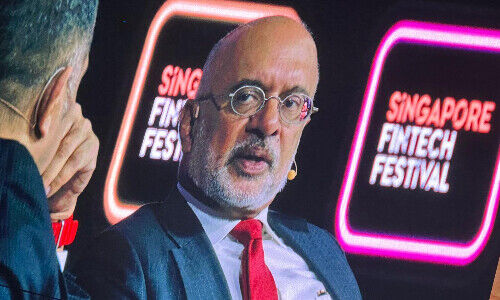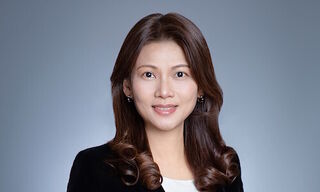Santosh Brivio: «Lessons We Can Learn From the Coronavirus»
The coronavirus comes as a vivid reminder that our world is not as perfect as we had hoped and control measures not as far-reaching as we had assumed. This is the positive thing that will remain after the outbreak, Santosh Brivio writes on finews.first.
This article is published on finews.first, a forum for authors specialized in economic and financial topics.
«The only thing we should fear is fear itself,» said French philosopher Michel de Montaigne in the 16th century. In light of the global concern about the coronavirus (Covid-19), his words are as valid as they have ever been. According to the latest information available, the virus is not even such a terrible illness, even if a great many people have already died from it. The illness remains unproblematic in most cases.
And despite this, our society has been paralyzed by the virus. The fear of an uncontrollable spread has halted large parts of our economy, sent global stock markets into a downward spiral and is hampering our social lives. We really do fear – instead of fearing the fear.
«The long incubation period is unsettling»
One reason for this collective paralysis is that through the spread of the virus we get exposed to a feeling that we have almost forgotten about: the feeling of impotence, which we cannot ignore even with the best of will. Or, put differently: our mechanism of supersession has been deactivated by the spread of the disease, a typically unconscious and quite probably vital mechanism.
The virus is here. Invisible, but right in our midst. The long incubation period, during which the infected are contagious, is unsettling and shakes the foundation of everyday life. Doesn't the cough of our son sound slightly suspicious after coming home from daycare? Wasn’t the neighbor in Italy recently?
«We have been very comfortable in his wealthy world»
The uncertainty is unsettling. Even if everyone in our immediate environment is well it is in theory still fully possible that we all are carriers of the virus. Does it then make sense to visit aging grandparents? The idea that the closure of schools will have the opposite effect than helping to contain the spread of the virus if many children are taken care of by grandparents, because the parents need to go to their job, shows in an exemplary fashion just how tricky even well-intentioned measures can be.
We have been very comfortable in this wealthy world, a place where we see what we want and believe to be in control whenever necessary. In principle, this is fine. After all, we can rightly claim that the chance of having a long, happy life in good health is higher across the world than it was 50 or 100 years ago.
But the coronavirus now is making it plain that the world isn’t quite as perfect as we would like it to be, and that our means of control are not as encompassing as we told ourselves. And this in a way is the positive that we can take from the spread of Covid-19: it helps us getting more conscious about many, quite diverse things.
«There are events, phenomenon and developments that are outside of our control»
As participants of the economy we become aware of how fragile world trade is, even if it looks a certainty. It dawns on us investors that central banks won’t be able to keep stock markets sweet under all circumstances even with the strongest monetary policy measures available. Living as we do in a liberal society we are reminded of how decisive responsible behavior is – not only for us as a guideline, but also so that we can rely on others to act similarly.
And, last but not least, the coronavirus helps us become conscious about the fact that there are events, phenomenon and developments that are outside of our control – a not inconsiderable insight. Even when the corona epidemic one day has abated, other huge challenges will remain. To approach those challenges not only with confidence but also a certain humbleness will not be completely wrong.
Santosh Brivio is senior economist at Migros Bank and focuses on the economic and financial market development. Before joining Migros Bank in 2020, he spent seven years at Raiffeisen. His last position there was as head of advisory services and responsible for «thematic investment». He took his first job in finance in 2009 as a scientific and personal adviser of a managing partner at Bank Wegelin. Brivio is a chartered alternative investment analyst (CAIA).
Previous contributions: Rudi Bogni, Peter Kurer, Rolf Banz, Dieter Ruloff, Werner Vogt, Walter Wittmann, Alfred Mettler, Peter Hody, Robert Holzach, Craig Murray, David Zollinger, Arthur Bolliger, Beat Kappeler, Chris Rowe, Stefan Gerlach, Marc Lussy, Nuno Fernandes, Richard Egger, Maurice Pedergnana, Marco Bargel, Steve Hanke, Urs Schoettli, Ursula Finsterwald, Stefan Kreuzkamp, Oliver Bussmann, Michael Benz, Peter Hody, Albert Steck, Martin Dahinden, Thomas Fedier, Alfred Mettler, Brigitte Strebel, Peter Hody, Mirjam Staub-Bisang, Nicolas Roth, Thorsten Polleit, Kim Iskyan, Stephen Dover, Denise Kenyon-Rouvinez, Christian Dreyer, Kinan Khadam-Al-Jame, Robert Hemmi, Anton Affentranger, Yves Mirabaud, Katharina Bart, Frédéric Papp, Hans-Martin Kraus, Gerard Guerdat, Mario Bassi, Stephen Thariyan, Dan Steinbock, Rino Borini, Bert Flossbach, Michael Hasenstab, Guido Schilling, Werner E. Rutsch, Dorte Bech Vizard, Adriano B. Lucatelli, Katharina Bart, Maya Bhandari, Jean Tirole, Hans Jakob Roth, Marco Martinelli, Thomas Sutter, Tom King, Werner Peyer, Thomas Kupfer, Peter Kurer, Arturo Bris, Frederic Papp, James Syme, Dennis Larsen, Bernd Kramer, Ralph Ebert, Armin Jans, Nicolas Roth, Hans Ulrich Jost, Patrick Hunger, Fabrizio Quirighetti, Claire Shaw, Peter Fanconi, Alex Wolf, Dan Steinbock, Patrick Scheurle, Sandro Occhilupo, Will Ballard, Michael Bornhaeusser, Nicholas Yeo, Claude-Alain Margelisch, Jean-François Hirschel, Jens Pongratz, Samuel Gerber, Philipp Weckherlin, Anne Richards, Antoni Trenchev, Benoit Barbereau, Pascal R. Bersier, Shaul Lifshitz, Klaus Breiner, Ana Botín, Martin Gilbert, Jesper Koll, Ingo Rauser, Carlo Capaul, Claude Baumann, Markus Winkler, Konrad Hummler, Thomas Steinemann, Christina Boeck, Guillaume Compeyron, Miro Zivkovic, Alexander F. Wagner, Eric Heymann, Christoph Sax, Felix Brem, Jochen Moebert, Jacques-Aurélien Marcireau, Peter Hody, Ursula Finsterwald, Claudia Kraaz, Michel Longhini, Stefan Blum, Zsolt Kohalmi, Karin M. Klossek, Nicolas Ramelet, Søren Bjønness, Lamara von Albertini, Andreas Britt, Gilles Prince, Fabrizio Pagani, Darren Willams, Salman Ahmed, Stephane Monier, and Peter van der Welle, Beat Wittmann, Ken Orchard, Michael Welti, Christian Gast, Didier Saint-Georges, Jeffrey Bohn, Juergen Braunstein, Jeff Voegeli, Gérard Piasko, Fiona Frick, Jean Keller, Stefan Schneider, Matthias Hunn, Andreas Vetsch, Fabiana Fedeli, Marionna Wegenstein, Kim Fournais, Carole Millet, Ralph Ebert, Lars Jaeger, Swetha Ramachandran, Brigitte Kaps, Thomas Stucki, Teodoro Cocca, Neil Shearing, Claude Baumann, Guy de Blonay, Tom Naratil, Oliver Berger, and Robert Sharps.



























